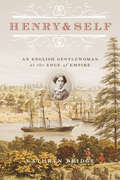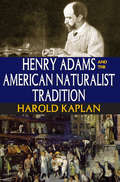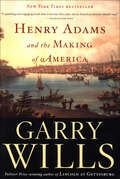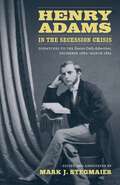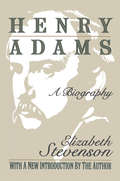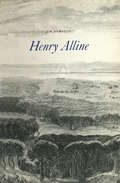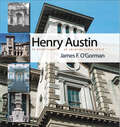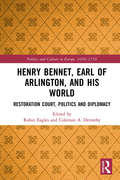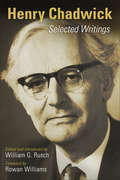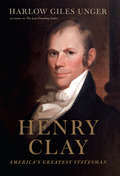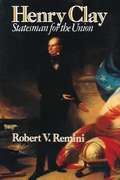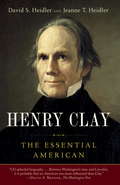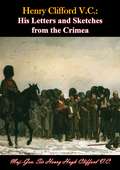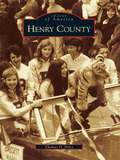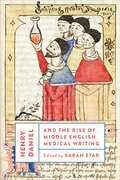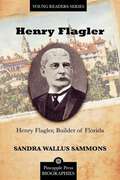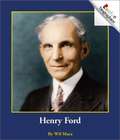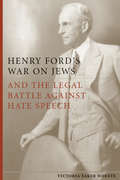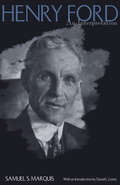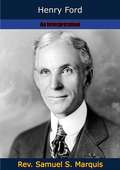- Table View
- List View
Henry & Self: An English Gentlewoman at the Edge of Empire
by Kathryn BridgeAn intimate portrait of privilege and struggle, scandal and accolade, from the Old World to the new colonies of Vancouver's Island and British Columbia.At the age of 33, Sarah Crease left her home in England to travel with her young family to a farflung outpost of the British Empire on the Pacific coast of North America. The detailed journals, letters and artwork she created over the next half century as she and her husband, Henry, established themselves in the New World offer a rich window into the private life and views of an English colonist in British Columbia.This is a woman's story in her own words. It is also a story of the times she lived in, and of how her class, social standing and role as a settler shaped her relationships with the world around her. Henry & Self is the personal account of a remarkable woman who lived through nearly a century of colonial history, but it is also a unique perspective on the beliefs and motivations that shaped that century.
Henry Adams and the American Naturalist Tradition
by Harold KaplanThe naturalist tradition in American fiction was a product of the tremendous changes wrought in late nineteenth-century America by the development of science and technology and by the intellectual upheavals associated with the ideas of Darwin, Marx, Nietzsche, and Freud. This book is an account of naturalism, perhaps the strongest and most influential intellectual tradition or, as Harold Kaplan would argue, mythology to affect modern American literature and culture.Kaplan approaches the naturalist writers through a study of Henry Adams. He sees in Adams the paradigmatic intelligence of his time a prophetic mind, though not a seminal one and a man absorbed with the twin notions of power and order. Adams's major work illustrates the joining of a literary imagination and moral temperament with an almost obsessive response to the science, economic life, and politics of his world. Adams's work exemplifies what Kaplan calls the myth of metapolitics a view of human struggle and fate profoundly dominated by naturalist concepts of power.Kaplan then turns to the fascination that power in its various manifestations material, moral, social, political held for writers such as Dreiser, Norris, Crane, and others. Their dramatic plots, characters, and allegorical images are examined in detail. In wider reference, this book should concern those who are interested in problems of modern ethics and politics in the effort to harmonize concepts of value with images of power and natural order.
Henry Adams and the Making of America
by Garry WillsNew York Times Bestseller: From a Pulitzer Prize winner, a “sparking and engaging book that everyone who cares about America’s history should read” (The Washington Post).In this book, one of today’s greatest historians offers a surprising new view of the greatest historian of the nineteenth century: Henry Adams. Garry Wills, author of Lincoln at Gettysburg, showcases Adams’s little-known but seminal study of the early United States and elicits from it fresh insights on the paradoxes that roil America to this day. Adams drew on his own southern fixation, his extensive foreign travel, his political service in Lincoln’s White House, and much more to invent the study of history as we know it. His nine-volume chronicle of America from 1800 to 1816 established new standards for employing archival sources, firsthand reportage, eyewitness accounts, and other techniques that have become the essence of modern history.Adams’s innovations went beyond the technical; he posited an essentially ironic view of the legacy of Jefferson and Madison. As is well known, they strove to shield the young country from “foreign entanglements,” a standing army, a central bank, and a federal bureaucracy, among other hallmarks of “big government.” Yet by the end of their tenures they had permanently entrenched all of these things in American society. This is the “American paradox” that defines us today: the idealized desire for isolation and political simplicity battling against the inexorable growth and intermingling of political, economic, and military forces. As Wills compellingly shows, the ironies spawned two centuries ago still inhabit our foreign policy and the widening schisms over economic and social policy. Ambitious in scope, nuanced in detail and argument, Henry Adams and the Making of America throws brilliant light on how history is made—in both senses of the term.“Felicitous prose and compelling argument.” —Publishers Weekly (starred review)“Wills [is] incapable of writing a dull paragraph.” —Los Angeles Times
Henry Adams in the Secession Crisis: Dispatches to the Boston Daily Advertiser, December 1860-March 1861 (Library of Southern Civilization)
by Mark J. StegmaierDuring the Secession Winter session of Congress, twenty-two-year-old Henry Adams worked as private secretary to his father, Representative Charles Francis Adams. Henry wrote four accounts of these crucial months in Washington -- an essay, letters to his brother, a segment in his famous autobiography, and twenty-one unsigned letters that Adams composed as a novice correspondent for the Boston Daily Advertiser. Henry Adams in the Secession Crisis presents the Advertiser letters for the first time since their original publication between 1860 and 1861.During the months prior to the Civil War, Adams provided unusual insights into the development of the secession crisis and the attempts of Congress to resolve it peacefully. Since his father and Senator William H. Seward of New York led the efforts of more moderate Republicans to reach a compromise that would at least hold the border slave states in the Union, Adams's letters emphasize and illuminate their efforts and those of their Unionist allies in the upper South. While praising their endeavors -- and particularly the statesmanship of Seward -- Adams attacked southern secessionists and, in several letters, critically analyzed and condemned the famous Crittenden Compromise as a measure impossible for any Republican to support. Fully annotated by historian Mark J. Stegmaier, the Advertiser letters illuminate the politics of the secession crisis while showcasing the youthful work of a man who would become one of the most famous American writers of the late nineteenth century.
Henry Adams: A Biography
by Elizabeth StevensonHenry Brooks Adams was an American historian and member of an elite New England political family, descended from two U.S. Presidents--John Adams and John Quincy Adams. With the publication of his autobiography, "The Education of Henry Adams," in 1907, Henry Adams became the interpreter of his age. His insights and his attacks on the chaos and complexity of modern times stirred people everywhere. Depicting himself as a man seeking the meaning of life, he concluded that the quest ended in failure and predicted universal dissolution. Yet the picture he drew of himself was not complete, and since his death in 1918, he has become one of the most controversial figures in American letters. This is the first biography to give a well-rounded portrait of Adams and to shed a full light on his unique personality and writings.
Henry Adams: A Biography
by Elizabeth StevensonHis great grandfather and his grandfather had been presidents of the United States, and to a small boy this seemed a matter of course in his family. But Henry Adams, belonging to a later generation, coming to maturity at the time of the Civil War, found himself in an age uncongenial to the leadership of such men as his ancestors. In the changing world of the late nineteenth century and early twentieth century, Adams found his rightful place as an observer and critic rather than a participant in public life. But no time and no country ever had a keener mind to take note of the comic and tragic qualities embedded in the political, economic, and human drama upon which he gazed. And his writings appeal timelessly in their incisive wit, their warm charm, and in the way they speak to us of a very individual personality. When Stevenson's book first appeared, the New York Times called it 'One of the noteable biographies of recent years,' and it won the Bancroft Prize that year. It remains an engrossing portrait of a remarkable man.It is good to take note of the sage he became in his late, great books: Mont-St. Michel and Chartres and The Education of Henry Adams. This biography explains how Henry Adams became the man both admired and feared in his later years. He was first a bright, unformed young man who was a diplomatic assistant to his father; then an ambitious journalist, a writer of several 'sensational' newspaper and magazine articles. Next he became a provocative and innovative teacher, and a historian unequalled in his presentation of the Jeffersonian period. Until his wife's tragic death, he was a willing actor on the social scene of his beloved Washington, D.C. Throughout, he remained a friend and instigator of the careers of friends in artistic and scientific fields. His writings speak to us still and seem contemporary in their tone as well as their view of cycles of culture and their warnings of decline and achievement.
Henry Alline: 1748-1784
by J. M. BumstedTo Canadians of this century the name of Henry Alline is almost unknown. This biography introduces him to the general reader. Through the story of his life it also recreates the early settlement of the Maritime provinces, and examines the origins of one of the most dominant and continuing themes in Canadian life, evangelical pietism. Henry Alline emigrated from Rhode Island to Nova Scotia with his parents in 1760. Following his religious conversion during adolescence, he became an evangelical preacher and travelled throughout Nova Scotia spreading the gospel. But Alline was more than an itinerant preacher. Drawing on British (and indirectly on German) mythical writings, he rejected the tenets of Calvinism in favour of universal salvation and human free will. He emphasized Christian asceticism and mysticism. His writings, and his attempts to develop an intellectual rationale for his evangelical position, made him Canada's first metaphysical and mystical philosopher.In the history of early British settlement in Nova Scotia the name of Alline stands out because of his participation in the process and problems of settlement and his leadership during the trying times of the American Revolution. His career embodied a rejection of both the United States (by a rejection of Puritanism) and of Britain (by a rejection of church and state in Nova Scotia), and put Alline in a classic Nova Scotia position, neutrality, which could be justified by the importance of Christ and the relative unimportance of government. The years in which Alline lived were particularly critical ones for Canada, and his career both mirrors and dominates a period of pioneer hardships, political crises, and spiritual concern born of the uncertainties of human existence.
Henry Austin: In Every Variety of Architectural Style (Garnet)
by James F. O'GormanWinner of the Historic New England Book Prize (2009) Winner of the Henry-Russell Hitchcock Book Award (2010) Henry Austin's (1804–1891) works receive consideration in books on nineteenth-century architecture, yet no book has focused scholarly attention on his primary achievements in New Haven, Connecticut, in Portland, Maine, and elsewhere. Austin was most active during the antebellum era, designing exotic buildings that have captured the imaginations of many for decades. James F. O'Gorman deftly documents Austin's work during the 1840s and '50s, the time when Austin was most productive and creative, and for which a wealth of material exists. The book is organized according to various building types: domestic, ecclesiastic, public, and commercial. O'Gorman helps to clarify what buildings should be attributed to the architect and comments on the various styles that went into his eclectic designs. Henry Austin is lavishly illustrated with 132 illustrations, including 32 in full color. Three extensive appendices provide valuable information on Austin's books, drawings, and his office
Henry Bennet, Earl of Arlington, and his World: Restoration Court, Politics and Diplomacy (Politics and Culture in Europe, 1650-1750)
by Robin EaglesThis book offers the first major reassessment of the life and work of Sir Henry Bennet, earl of Arlington, for over a century. Arlington was one of Charles II’s chief ministers and the book charts his early years through to the careers of his descendants, examining his political development as a courtier, diplomat, linguist and politician. Authored by a series of experts in the field, the book not only shines a light on his career, but also on Charles II’s reign as a whole, on the Cavalier court and on Restoration politics. Arlington was a significant player in international politics and this is reflected in the collection’s treatment of his time abroad in the 1650s, his central role as an advisor and ambassador, and his influence in Ireland.
Henry Chadwick: Selected Writings
by Henry ChadwickRare scholarly insight into the early church — still relevant for the church today This anthology offers a choice selection of writings by one of the twentieth century&’s premier church historians, Sir Henry Chadwick. Many of Chadwick&’s considerable contributions to a fuller understanding of the early church were unpublished or not circulated widely during his lifetime, but here they are compiled in a convenient, accessible form. Reflecting Chadwick&’s wide-ranging expertise, this volume contains his essays on a variety of themes pertaining to the early church, including the emerging faith&’s relationship to classical culture; the interaction between piety, politics, and theology; councils in the early church; the power of music in the church; and more. As relevant for the study of early Christianity today as when they were first written, Chadwick&’s essays remain a valuable resource for better understanding the church both past and present, shedding light on ecumenical problems that still keep Christians visibly divided.
Henry Chadwick: Selected Writings
by Henry ChadwickRare scholarly insight into the early church — still relevant for the church today This anthology offers a choice selection of writings by one of the twentieth century&’s premier church historians, Sir Henry Chadwick. Many of Chadwick&’s considerable contributions to a fuller understanding of the early church were unpublished or not circulated widely during his lifetime, but here they are compiled in a convenient, accessible form. Reflecting Chadwick&’s wide-ranging expertise, this volume contains his essays on a variety of themes pertaining to the early church, including the emerging faith&’s relationship to classical culture; the interaction between piety, politics, and theology; councils in the early church; the power of music in the church; and more. As relevant for the study of early Christianity today as when they were first written, Chadwick&’s essays remain a valuable resource for better understanding the church both past and present, shedding light on ecumenical problems that still keep Christians visibly divided.
Henry Clay: America's Greatest Statesman
by Harlow Giles UngerA compelling new biography of America's most powerful Speaker of the House, who held the divided nation together for three decades and who was Lincoln's guiding light
Henry Clay: Statesman for the Union
by Robert V. ReminiAmong nineteenth-century Americans, few commanded the reverence and respect accorded to Henry Clay of Kentucky. As orator and as Speaker of the House for longer than any man in the century, he wielded great power, a compelling presence in Congress who helped preserve the Union in the antebellum period. Remini portrays both the statesman and the private man, a man whose family life was painfully torn and who burned with ambition for the office he could not reach, the presidency.
Henry Clay: Statesman for the Union (citated)
by Robert V. ReminiRobert V. Remini summed up the sentiment that many people of the antebellum period of U.S. history had about Henry Clay. "Henry Clay was one of the most gifted men of his age. He distinguished himself as a public speaker, a lawyer, a politician, and Speaker of the House of Representatives. He might have made a truly great President" ([PAGE 209 OF THE TEXT]) if he had been given a chance. While praising Henry Clay, Remini also cited evidence that portrayed Clay as a controlling, hot-tempered, and often irrational, and immoral man. At times, people had trouble interacting with him while at other times he was extremely hospitable and friendly. In short, Remini described a man who both clamored for political power and, at the same time, wanted to contribute to the success of the country; that is, he deeply yearned for and acted in a manner that he thought was best for the union while simultaneously believing that he was the most qualified for this difficult task. In this biography, Remini described both the political and personal life of Henry Clay. Through this portrayal, the reader not only gains insight into the personal and political life of Henry Clay, but learns about the historical and cultural aspects of the time. The reader is able to enter into the struggles and conflicts of the age. These conflicts included such aspects as slavery and party politics. Even though this biography is non-fiction, it often reads as a fictional novel. Remini interspersed anecdotes, letters, and other writings into the historical details of the biography to allow the reader to understand the character and personality of Henry Clay and other famous and ordinary people. The biography is replete with numerous footnotes that give the biography authenticity as well as give the reader knowledge about the period and explanations about aspects that might not be understood by non-historians.
Henry Clay: The Essential American
by David S. Heidler Jeanne T. HeidlerHe was the Great Compromiser, a canny and colorful legislator whose life mirrors the story of America from its founding until the eve of the Civil War. Speaker of the House, senator, secretary of state, five-time presidential candidate, and idol to the young Abraham Lincoln, Henry Clay is captured in full at last in this rich and sweeping biography.David S. Heidler and Jeanne T. Heidler present Clay in his early years as a precocious, witty, and optimistic Virginia farm boy who at the age of twenty transformed himself into an attorney. The authors reveal Clay's tumultuous career in Washington, including his participation in the deadlocked election of 1824 that haunted him for the rest of his career, and shine new light on Clay's marriage to plain, wealthy Lucretia Hart, a union that lasted fifty-three years and produced eleven children.Featuring an inimitable supporting cast including Thomas Jefferson, James Madison, and Abraham Lincoln, Henry Clay is beautifully written and replete with fresh anecdotes and insights. Horse trader and risk taker, arm twister and joke teller, Henry Clay was the consummate politician who gave ground, made deals, and changed the lives of millions.d replete with fresh anecdotes and insights. But it is Henry Clay who often rises above them all. Horse trader and risk taker, arm twister and joke teller, Clay was the consummate politician who gave ground, made deals, and changed the lives of millions. His life is an astounding tale--and here superbly told.From the Hardcover edition.
Henry Clifford V.C.: His Letters and Sketches from the Crimea
by Maj.-Gen. Sir Henry Hugh Clifford V.C.First published in 1956, this book is a rich collection of letters written by Major-General Sir Henry Clifford during his service in the Crimean War, where he received the appointment of aide-de-camp to Sir George Brown, commanding the light division, and was present at Alma and Inkerman. For his gallantry in the latter battle, Clifford was decorated with the Victoria Cross, in honour of leading one of the charges, killing one of the enemy with his sword, disabling another, and saving the life of a soldier."In reading these letters one cannot fail to be impressed by the noble character of the writer: a man of great courage, both moral and physical, a fine leader of men, and a first-rate officer, quick in his grasp of a difficult situation, forthright in his opinions and criticisms. Even by our standards of today he would certainly be classed as well above the average of his rank. [...]It is a great privilege to read these frank and vivid letters of 100 years ago and to learn from them at first hand of the courage and endurance of the British soldier in adversity."Richly illustrated throughout with Clifford's own sketches and notes, plus three maps.
Henry County
by Thomas D. PerryFormed in January 1777, Henry County was named for the Commonwealth of Virginia's first governor, Patrick Henry, who lived in the county from 1779 until 1784. Located along the border of North Carolina, the county was once home to the famous antebellum Hairston family. In the 20th century, textiles, furniture, and the chemical manufacturer DuPont made up the large industrial base of the county. With the recent outsourcing of jobs, the county has turned to other economic sources such as the Martinsville Speedway, Virginia Museum of Natural History, and the Bassett Historical Center, which provided most of the photographs in this book.
Henry Daniel and the Rise of Middle English Medical Writing
by Sarah StarHenry Daniel, fourteenth-century medical writer, Dominican friar, and contemporary of Chaucer, is one of the most neglected figures to whom we can attribute a substantial body of extant works in Middle English. His Liber Uricrisiarum, the earliest known medical text in Middle English, synthesizes authoritative traditions into a new diagnostic encyclopedia characterized by its stylistic verve and intellectual scope. Drawing on expertise from a range of scholars, this volume examines Daniel’s capacious works and demonstrates their significance to many scholarly conversations, including the history of late medieval medicine. It explains the background for Daniel’s uroscopic and herbal work, describes all known versions of the Liber Uricrisiarum and traces revisions over time, analyses Daniel’s representations of his own medical practice, and demonstrates his influence on later medical and literary writers. Both a companion to the recently published reading edition of the Liber Uricrisiarum and a work of original scholarship in its own right, this collection promotes a wider understanding of Daniel’s texts and prompts new discoveries about their importance.
Henry David Thoreau for Kids: His Life and Ideas, with 21 Activities
by Corinne SmithHands-on nature activities for the budding transcendentalist Author and naturalist Henry David Thoreau is best known for living two years along the shores of Walden Pond in Concord, Massachusetts. He is also known for spending a night in jail for nonpayment of taxes, which he discussed in the influential essay "Civil Disobedience." More than 150 years later, people are still inspired by his thoughtful words about individual rights, social justice, and nature. His detailed plant observations have even proven to be a useful record for 21st-century botanists. Henry David Thoreau for Kids chronicles the short but influential life of this remarkable thinker. In addition to learning about Thoreau's contributions to our culture, young readers will participate in engaging, hands-on projects that bring his ideas to life. Activities include building a model of the Walden cabin, keeping a daily journal, planting a garden, baking trail-bread cakes, going on a half-day hike, and starting a rock collection. The book also includes a time line and list of resources--books, websites, and places to visit--which offer even more opportunities to connect with this fascinating man.
Henry Flagler, Builder of Florida (Pineapple Press Biography)
by Dr. Sandra SammonsAn exciting biography about the man who changed Florida's east coast with his hotels and his Florida East Coast Railway.Henry Morrison Flagler was already a millionaire when he first visited Florida in 1878. He liked what he saw. He came back and built railroads along the east coast so that others could more easily come. And he built grand hotels so that those who came had a beautiful place to stay. By the end of his long and productive life, he had built a railroad all the way to the very end of the Keys. It arrived in Key West in 1912. Henry Flagler was very determined and practical. He met all the great challenges he set for himself.Ages 9-12Next in series > >See all of the books in this series
Henry Ford
by Wil Mara- Age-appropriate vocabulary- Clear linkage between text and photos- Includes archival reproductions where appropriate- Positioned in the middle Early Intervention range- Comprehensive glossary of "Words You Know"- Index makes navigating subject matter easy
Henry Ford for Kids: His Life and Ideas, with 21 Activities (For Kids series #61)
by Ronald A. ReisAn in-depth and realistic portrait of the man who "put America on wheels" Detailing Henry Ford's childhood as a precocious farm-boy mechanic, his revolutionary labor and production ideas, and the lasting legacy of his widespread philanthropy, author Ronald A. Reis also does not shy away from his eccentricities. The issues that stirred controversy are discussed, such as the industrialist's anti-Semitic views and his pacifist beliefs. Packed with historic photos and illuminating sidebars, Henry Ford for Kids brings the turn of the 20th century to life, touching on related topics such as the popularity of "auto polo," the Great War, and the life of industrial architect Albert Kahn. Twenty-one hands-on activities encourage budding innovators to apply engineering and production ideas and learn more about the era as kids will build a lemon-powered battery, make a moving assembly line, learn to dance the waltz, design an automobile dashboard, and much more.
Henry Ford's War on Jews and the Legal Battle Against Hate Speech
by Victoria Saker WoesteHenry Ford is remembered in American lore as the ultimate entrepreneur—the man who invented assembly-line manufacturing and made automobiles affordable. Largely forgotten is his side career as a publisher of antisemitic propaganda. This is the story of Ford's ownership of the Dearborn Independent, his involvement in the defamatory articles it ran, and the two Jewish lawyers, Aaron Sapiro and Louis Marshall, who each tried to stop Ford's war. In 1927, the case of Sapiro v. Ford transfixed the nation. In order to end the embarrassing litigation, Ford apologized for the one thing he would never have lost on in court: the offense of hate speech. Using never-before-discovered evidence from archives and private family collections, this study reveals the depth of Ford's involvement in every aspect of this case and explains why Jewish civil rights lawyers and religious leaders were deeply divided over how to handle Ford.
Henry Ford: An Interpretation
by David L. Lewis Samuel S. MarquisA reprint of the rare and controversial biography of Henry Ford, first published in 1923, written by Ford's close associate.
Henry Ford: An Interpretation (Great Lakes Books Ser.)
by Rev Samuel S. MarquisFirst published in 1923, this biography is widely regarded by many automotive historians as the finest and most dispassionate character study of Henry Ford ever written. Written by the Reverend Samuel S. Marquis, an Episcopalian minister who was also the head of the sociology department at Ford Motor Company, this collection of essays serves to analyze the “psychological puzzle such as the unusual mind and personality of Henry Ford presents.”A gripping read for history buffs and fans of historical biographies.“Students of Henry Ford should be delighted by this republication of Samuel S. Marquis’s shrewd evaluation of the legendary industrialist. A close friend and associate of Ford for many years, Marquis developed many compelling insights into the automobile maker’s character and personality. One comes away from this book with a much greater sense of what made Ford tick.”—STEVEN WATTS, Professor of History at the University of Missouri-Columbia and author of The People’s Tycoon: Henry Ford and the American Century“Marquis was the first Ford intimate to criticize the industrialist in print. Aware that he was treading on thin ice, Marquis recalled that Ford had told him that ‘the best friend one has is the man who tells him the truth.’ Hopefully, the clergyman remarked, ‘[he] will receive the critical portion of these pages in the same spirit.’ Ford emphatically did not...Marquis’s book would have been widely read had not the Ford organization been fairly successful in buying up copies and persuading book dealers not to sell it.”—DAVID L. LEWIS
